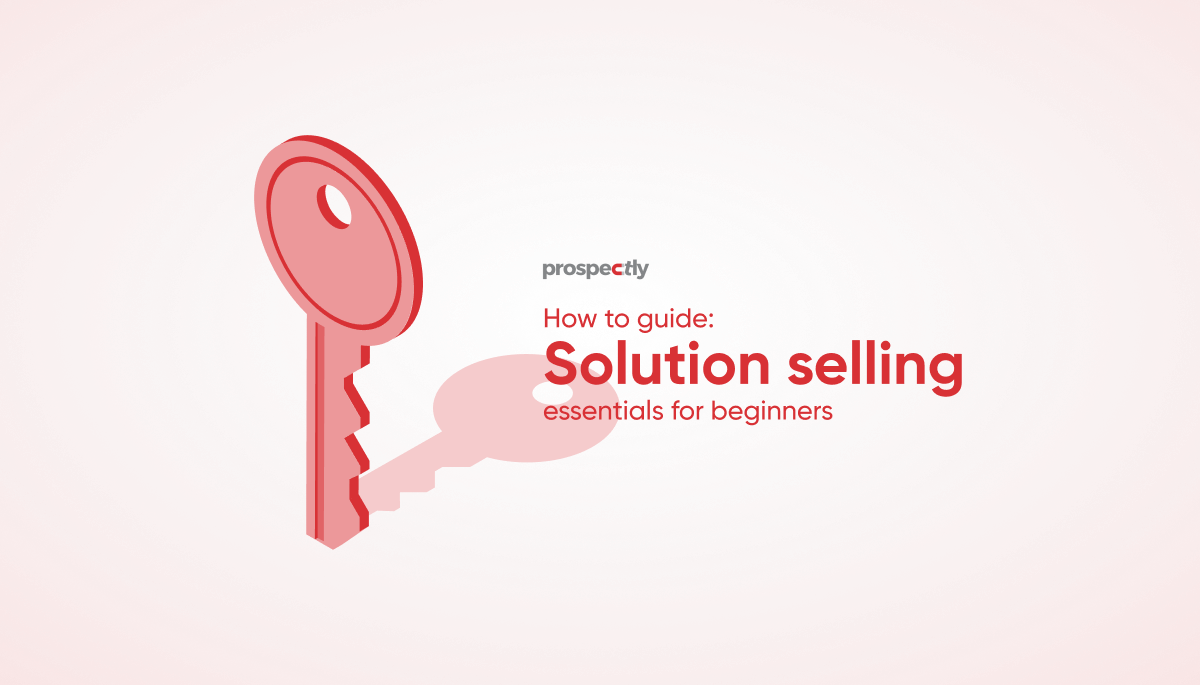Turn your sales coaching into a high performing machine

Are you one of the 75% of businesses that lose a slew of resources due to disorganized and informal coaching strategies – Brainshark.com? You can say goodbye to wasting your time, effort, and money. In this definitive guide, you’ll walk through everything you need to know about sales coaching. Want to up your game? Continue reading.
Let’s kick off with a sales coaching definition, shall we?
What is sales coaching?
According to several sales VIPs and directors who contribute to Quora, sales coaching is important.
[Sales] Coaching is helping someone do something better.
A [sales] coach is someone who can help you achieve something beyond your imagination.
And a more comprehensive sales coaching definition comes from Chris Orlob, Director of Sales at Gong.io and Start-up advisor.
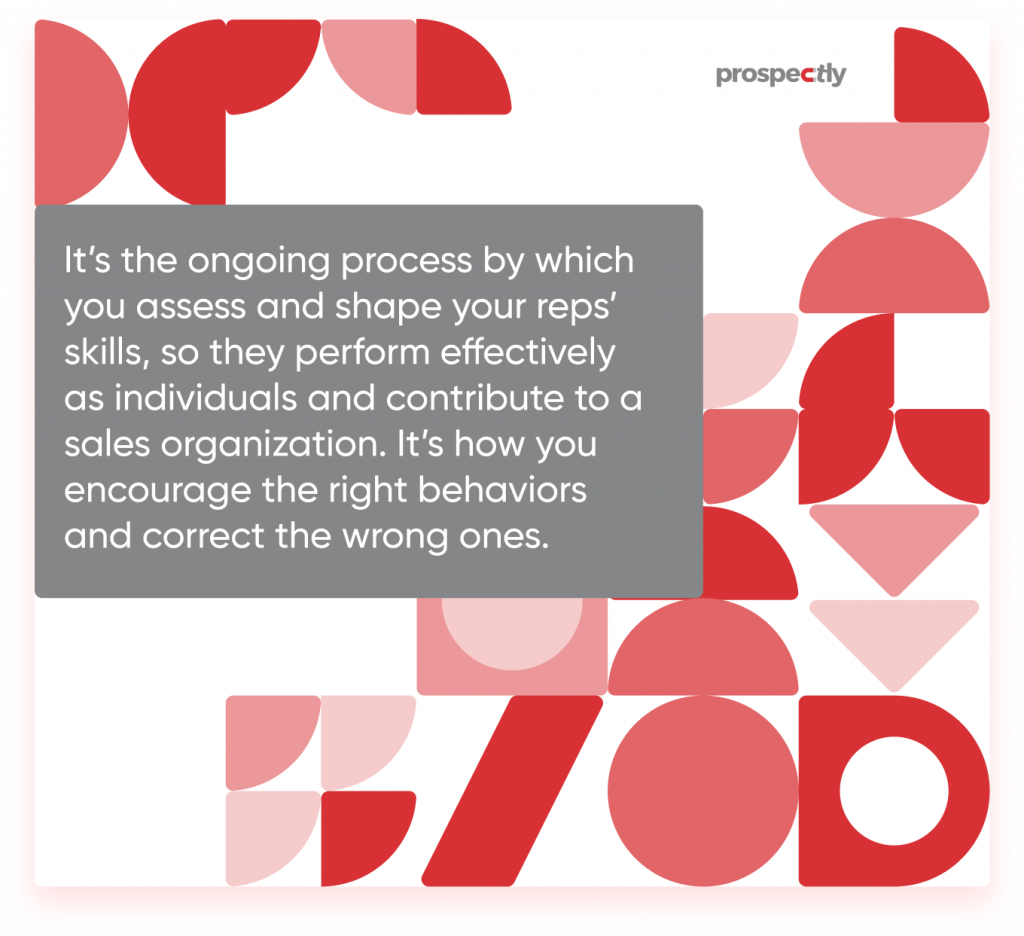
Here’s the main takeaway.
Sales coaching involves improving a salesperson’s performance by considering their individual needs and skills. It’s a continuous activity.
But you may wonder if there’s a difference between sales coaching and sales training.
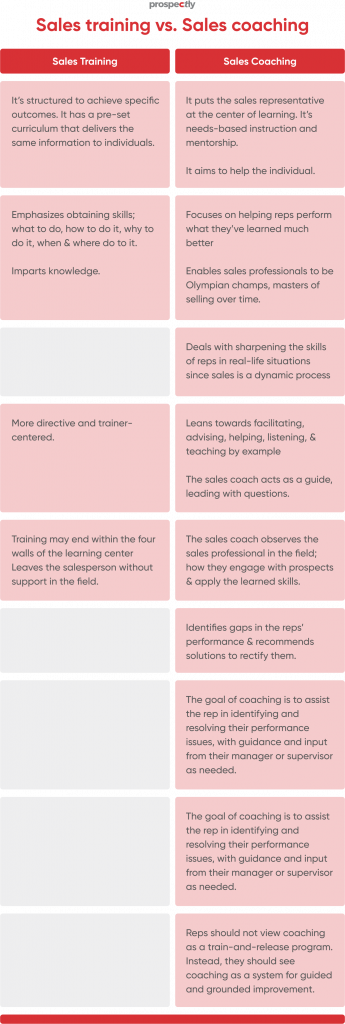
Sales coaching has many excellent pros. Dig in and enjoy!
Sales coaching benefits
Why is sales coaching important for your sales team?
Turns moderate reps into five-star performers
Typically, your sales team has three groups of sales people-the high-flying reps (20%), the average group (60%), and the low performers (60%).
The reps at the bottom can benefit from sales coaching, but the process can drag on. You need to spend your time, effort, and resources on the other SDRs. A practical sales coaching course can sharpen the moderate salespeople’s performance.
These sales representatives are already motivated and have remarkable results. However, they’re falling behind the champs. As a result, a coaching program is necessary to fine-tune their selling tactics.
You can turn the three-star reps into masters of selling through sales coaching. Your high-performers also need some polishing. Continuous sales coaching training programs can help them maintain their brilliant sales numbers.
Doubles your revenue
It makes sense to hone the sales force’s selling techniques because there’s a relationship between performance and sales. The more your reps improve their selling art, your company revenue can increase.
You’d want the sales team’s engine to be well-oiled and to fire from all cylinders. A proper sales coaching program can keep everyone on their toes.
A dynamic sales coaching program tends to have a 28% higher win rate than companies without such a program (LinkedIn).
Sales reps who get less than 30 minutes of sales coaching each week have a win rate of 43 percent. But those who get at least 2 hours have a win rate of 56% – Centerforsalesstrategy.com.
Boosts sales productivity
A personalized sales coaching course can inject a massive dose of confidence and motivation into your sales reps. That’s because they can perform tasks with excellence due to good coaching.
A highly motivated sales force can boost productivity by becoming self-driven and independent. Also, sales coaching provides salespeople with well-defined steps that lead to efficiency and increased output.
3 Types of sales coaching
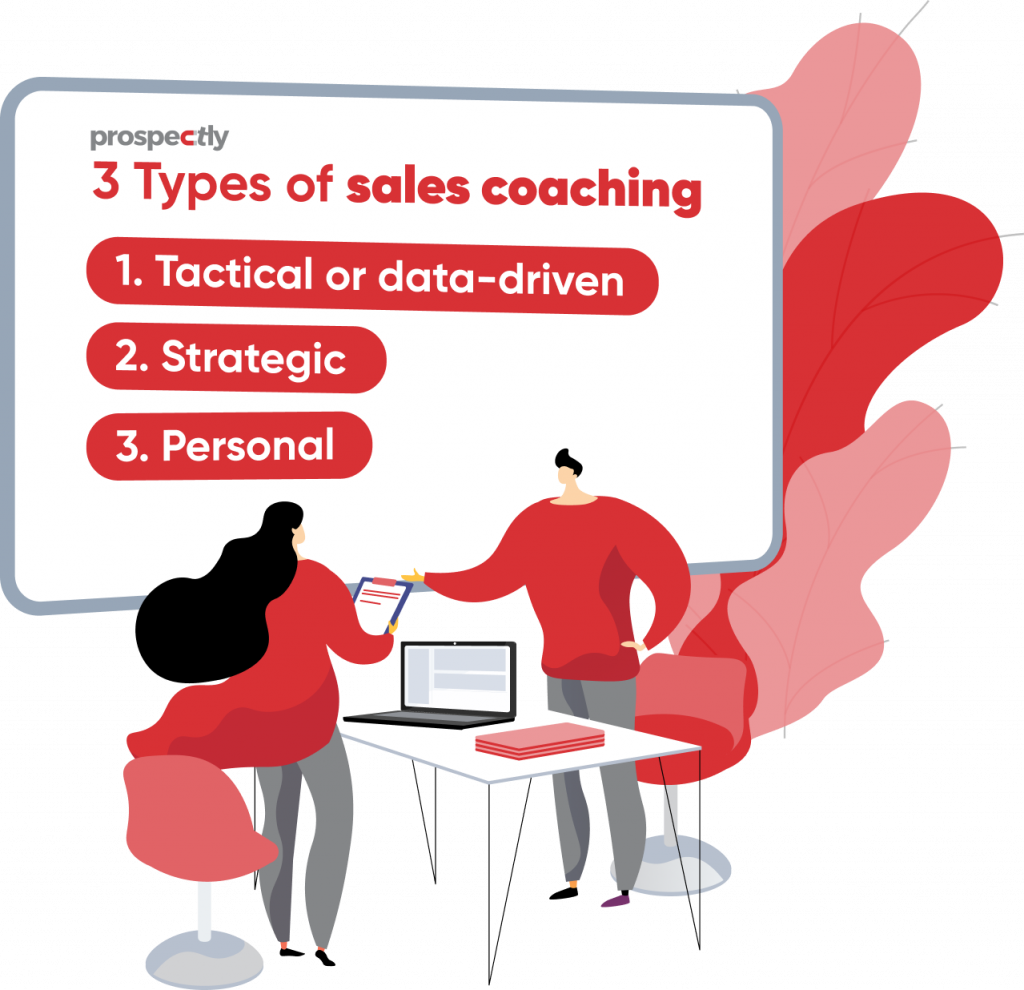
What are the types of sales coaching? There are three approaches to sales coaching you need to know.
1. Tactical coaching or data-driven sales coaching
How can you initiate conversations with your sellers to highlight wrong behaviors they must change? You can use opinion-based assessments, but they fall short of addressing the root causes of underperformance.
Instead, use data or sales metrics to pinpoint improvement areas for your reps. For example, you may discover that your sales team’s closing rate is low due to weak product demo presentation skills.
Or the number of scheduled meetings is dropping because of poor discovery call techniques. Once you’ve analyzed the key metrics or data, you can engage your reps to fix the challenges by suggesting specific tactics.
Want to hone your sellers’ discovery call skills? Dig deeper into discovery questions to land meetings.
How can you go about collecting data to use tactical coaching? Mindtickle.com suggests the following:
Product knowledge
Do your sellers know your product like the back of their hands? Assess and score their knowledge through written tests, quizzes, checklists, multiple-choice questions. Use role-plays to test the reps’ product demo skills. Some enablement tools can help.
Selling behavior
What’s the rep’s tone, enthusiasm, and fluency like on a call or during a presentation? Also, check for the number of filler words they use to assess their confidence in your offer.
Selling skills
How experienced is your salesforce in using a sales methodology on a product demo, call, dealing with objections, etc.? Sales managers can use real-time data to evaluate the messaging to close more deals.
Message consistency
How competent are your reps during the selling process? You can use AI tools to assess sales calls and why deals aren’t closing. The metrics can help sales leaders launch tactical coaching to improve questioning techniques.
Technology skills
What is the sales team’s skills level regarding sales tools, such as Salesforce, HubSpot, Zoom, LinkedIn Navigator, etc.? Evaluate and document your reps’ performance as they use the platforms.
Competitive knowledge
How well do the salespeople understand the competition in their industry? Update them on the latest developments and test their knowledge through quizzes.
Sales process
What’s the sales representatives’ grasp of your company’s sales process? Do they understand what they must do at each stage? A sales readiness tool can help assess this aspect through virtual role-plays.
Want to coach your sales team on the sale cycle? The sales process master guide can help you achieve that in no time.
2. Strategic coaching
You also need data to make your sales coaching meaningful for this method. Earlier, I highlighted how you could gather sales numbers to drive conversations. Strategic coaching helps with fixing deal-breakers before they get out of hand.
Festering deal-breakers can kill your sales. Here are some examples.
Non-responsive prospects
With many tech gadgets and online platforms, customers are becoming less responsive in today’s world. You can coach your reps on how to increase the reply rate through short videos in emails. Tools like Vidyard, Loom, etc., can be helpful in video prospecting.
Closing deals
Sales reps agree that closing deals are one of the biggest challenges. Declining win rates indicate that your representatives need strategic coaching on closing. Examples of fast closures include the ‘now’ or ‘never’ close, the ‘summary’ close, the ‘assumptive’ close, the ‘soft’ close, and the ‘question’ close.
The now and never closing deal creates a sense of urgency to show that your product offer or price package is available for a limited time. You can also coach reps to highlight the product benefits through a summary close before asking for a sale.
The assumptive close involves acting as if the buyer has already decided to buy. Teach the salesforce to frame the right questions, such as “when would you start subscribing to XYZ?”
Sales managers can also equip their sellers with the soft close strategy. It involves asking low-level questions to get more information from the prospect. You may say, “Would you like to know more about this coaching course if it decreased turnover by 75% and increased productivity by the same percentage?”
The question close tactic aims to arouse interest in the potential customer for your product/service. It lets you resolve concerns or objections your buyer may have when you’re about to close the sale. An example could be: “Would you say this solution would resolve your challenge?”
3. Personal coaching
As the name suggests, this kind of coaching focuses on the sales representatives themselves. That’s because they’re primarily responsible for breaking or making sales. As a result, it makes more sense to deal with them one-on-one.
The coaching strategy is ideal for reps whose performance is going off the rails. You want them to reset to factory settings, as it were. Retool and reboot.
But you need to find out what motivates them first to uncover the real causes. You could ask the following questions.
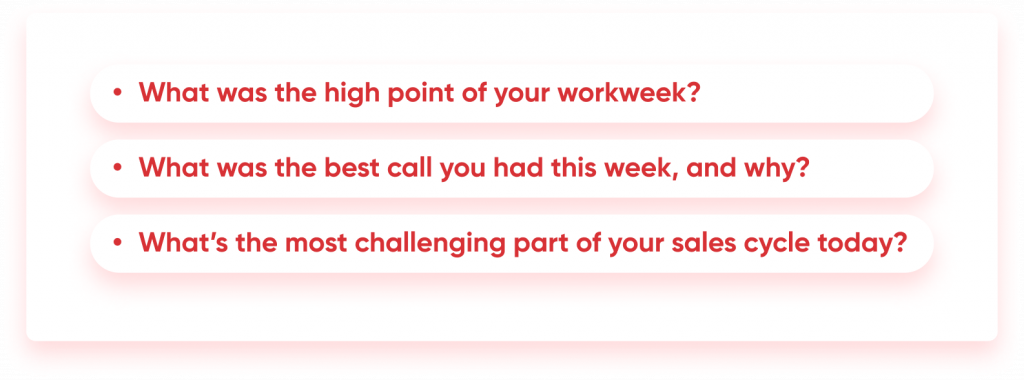
Answers to the questions can reveal where each rep is struggling and what specific assistance they need from personal coaching.
Want to up your game in coaching your salesforce? Continue reading to learn more.
Top 5 sales coaching tips
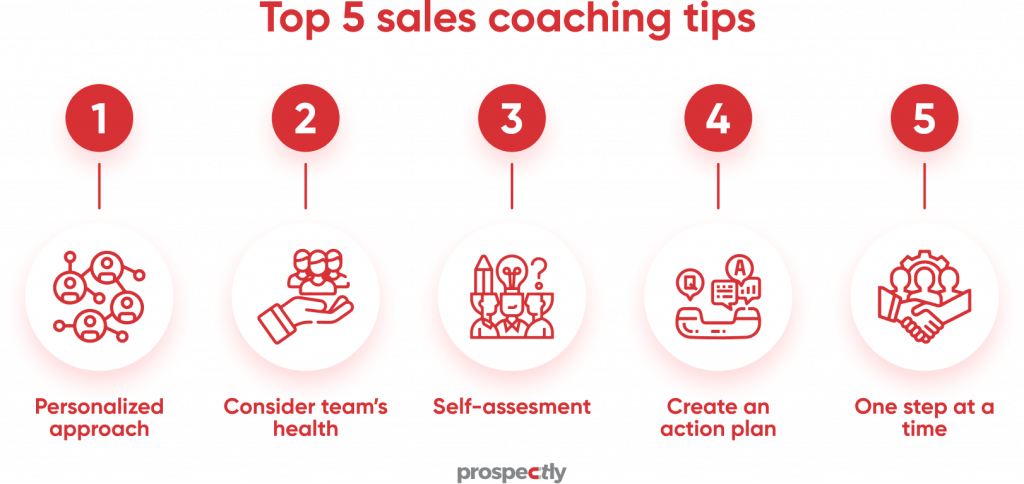
How can you make your sales coaching successful?
1. Embrace a personalized approach
We talked about personal coaching earlier, and we’re now adding more meat. Remember that coaching emphasizes making salespeople do things much better.
Also, reps have different skills, aptitudes, motivation levels, personalities, and needs. Because of this, it’d be self-defeating to apply the one-size-fits-all approach in coaching.
Instead, a sales coaching program or session tailored for each rep has more benefits than a mass-kind of coaching. You can understand each person’s strengths and weaknesses through individual sales coaching.
Before you begin coaching, have informal meetings with each sales rep to know who they are, their skills, and how they sell. You could also promote personal development by recommending podcasts, webinars, or books.
2. Consider the health of your team
The well-being of your team may seem an insignificant matter. But a study involving 200 participants shows that out of five reps, two have mental health challenges (Builtin.chttps://builtin.com/sales/sales-mental-health-strategiesom). As a result, it can affect performance.
Sales managers would do well to check in with their staff about their emotional well-being. Open-ended and straightforward questions can help you uncover underlying challenges. You can use your weekly one-on-one meetings where sales reps can freely share their concerns.
An example of a question could be something like, ‘what are your feelings about your workload?’ It can encourage sharing and discussions.
3. Promote self-assessment
Sales coaching can be more effective if you encourage each salesperson to evaluate themselves. You can ask leading questions to guide reps to rate their work.
Questions like ‘What challenges did you face last quarter?’ and ‘What can you learn from your wins and losses about how to interact with clients in the future?’ are perfect for self-evaluation.
4. Ask sellers to create an action plan
Coaching is different from sales training because it’s less direct and not a one-person show. As a result, giving your salesforce independence in setting their goals can lead to a successful coaching program. It promotes buy-in from your team.
After each sales team member has set their targets, request them to develop an action plan. It shows how they intend to achieve their outcomes within a specific period.
For example, an objective could be: ‘to make 40 calls per month.’ Suggested steps to meet the goal can range from identifying ideal customers to scheduling discovery calls with the prospects. A CRM tool can help the sellers visualize the action plan with this process.
To make reps accountable, you can ask them direct questions about progress concerning the sales plan. Or you can see the sales reps’ activities on the CRM platform and use the data for the sales coaching sessions.
5. Take one step at a time
One of the things to avoid in sales coaching is chasing too many sales tactics at one time or dishing out excessive info. It can lead to burnout. Instead, narrow your focus by concentrating on a few strategies one a time.
Say you observe that your sales reps have challenges with cold calling or product demos. You can develop sales scripts and coach the salesforce on perfecting the art in groups, role-plays, or one-on-one sales coaching. Focus on this skill until they master it.
Now let’s dive into the characteristics of an effective sales coaching program.
Sales coaching best practices
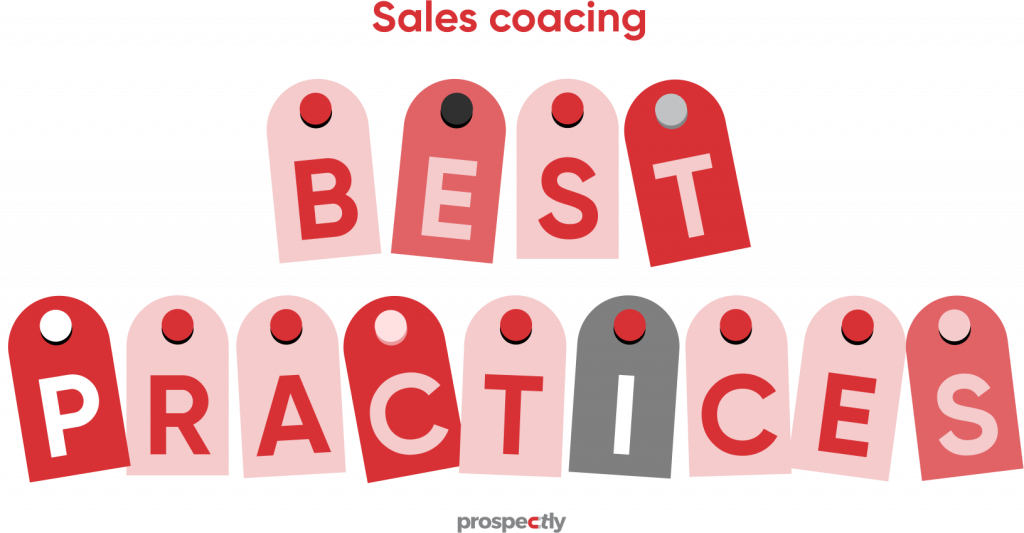
Selling strategies
We dug deeper into varied selling strategies. However, companies are different, so are the selling approaches. For your sales coaching/training program to be unique and relevant to your salespeople, it must align with your specific techniques in your industry.
Products / services
The chances are that your sellers have some knowledge about your products/ services. Your coaching should zero in on demonstrating how the team can successfully sell your solution. It needs to educate the salesforce on the critical product features and benefits or aspects that make you stand out from the crowd.
Specific sales barriers
Every sales process encounters objections or setbacks, such as time. It’d be best to deal with the obstacles in the sales coaching course to empower reps with the proper solutions. They become prepared to clear the roadblocks.
Coach’s commitment
Who is the best sales coach for your reps? A committed sales coach who wants to see your reps succeed is a perfect choice. Recall that coaching is an ongoing process, so you need someone prepared to be with the team for the long haul.
Experience also counts. “Sales coaching should definitely be provided by someone with sales experience, and it’d involve a combination of Coaching & Mentoring,” says a contributor on Quora.
Sales coaching plan templates
How can you launch your sales coaching plan? Check out the following examples.
2. Hubspot
3. Going.io
Wrapping up
Sales coaching is a vital exercise for your salesforce. Companies with a well-defined sales coaching training program can raise their revenue by 8.4% annually. The increase is 95% more than businesses without a sales coaching plan (Aberdeen Research).


